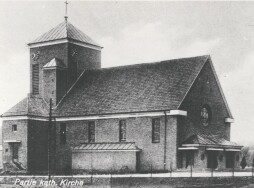
© Stadtarchiv Bocholt, Bildsammlung "Bilder aus dem Ortsteil Spork" Nr. 18
After ten months of construction, the new Ludgeruskirche church in Spork was completed and consecrated on 28 March 1933. The photo shows a view of the church looking north-east.Town history: The new construction of the Ludgerus Church in Spork
Bocholt city archive presents the historical "photo of the month"
In its monthly themed series, the Bocholt city archive is this time recalling the construction of the new Ludgeruskirche church in the Spork district in 1932/33.
"This is where we are building our new church", replied the workers when they were asked by passers-by from outside the village what was being built there. They were referring to the St. Ludgerus Church in Spork, the foundation stone of which had been laid on 21 June 1932. An emergency church had been set up on the Heidefeld estate in 1919 for the 752 Catholic inhabitants of the Spork farming community. Ten years later, the Spork branch district was elevated to a rectorate district within the parish of St. Georg, and on 1 April 1933 it was given the status of an independent rectorate parish with its own property administration.
When the Bishop of Münster, Johannes Poggenburg, finally granted permission to build a church in Spork in June 1932, the architect, Dipl.-Ing. Karl Tangerding, stood on the future church square, pulled a piece of paper out of his cigarette packet and drew a sketch of the new church building, which was then essentially realised.
The site of the church was the former cycling track built in 1900 next to the Heidefeld estate. "The loud race on a hard track for a record and external honour is replaced by quiet contemplation and prayer for eternity", wrote Tangerding in his statement. His design envisaged a building measuring 23.5 by 15 metres with clear lines in the style of Westphalian village churches, which was to be erected around 70 metres from the Bocholt-Dinxperlo district road. The ground floor of the approximately 25 metre high tower also formed the choir room.
The building shell was approved by master builder Wiese from Liedern on 10 October 1932. One month later, the bell foundry Petit & Gebr. Edelbrock from Gescher delivered three bells, which were solemnly consecrated on 20 November 1932. During the following winter, work on the building site came to a standstill. They were only resumed in the spring with the decoration of the church interior.
After ten months of construction, the work was completed and the consecration took place on 28 March 1933. The photo shows a view of the church looking north-east. After its completion, the Bocholter Volksblatt newspaper wrote, among other things: "Breit und behäbig und so nicht umzuwerfen, wie dem Münsterländer Bauer, lagert sie in der schönen Frühlingslandschaft. [...] The church lies between the meadows and fields as if it had always been there."
Text: Wolfgang Tembrink, Bocholt town archives


